Konkani South Indian Wedding
Marriage is a big day in life.
The most awaited day in one’s life-time. Along with the D-day comes loads of
customs, traditions, rituals, beliefs, blessings, the list does not end here.
It is always a pleasure to know
things which I have never known before. India is land of traditions and
variety, multi-lingual, multi-religion, multi-culture, multi-tradition and so
on. I get very excited when I get to attend events, as sort of new and very
new.
I recently got a chance to attend
a Konkani Wedding. There are a lot of happenings on stage and off stage, and of
course back stage too.
I could sense a lot of things
from the entire scene happening on stage. The Konkani Groom, Konkani Bride,
Konkani Bridal Hairstyle, Konkani Bridal Saree Style, Konkani Bride’s Mother,
Konkani Bride’s Father, Konkani Groom’s Parents, the near relatives style of
dressing, the maternal uncles’ role and
participation in the wedding rituals and arrangements, the Konkani Style
Buffet, all these are worth watching and
capturing.
The Main Stage of the Konkani
Wedding:
The Wedding venue is all decorated
with color full flowers making the ceremony hall look very attractive. The
focus lights add more life to the whole affair.
There seems to be like never
ending rituals for the bride along with her parents. The pandit/purohit (read
priest) makes the trio perform lot many rituals. Stand-do-sit-bend-bow-join
hands; lot of things.
And of course, these lots of
things do have a lot of meanings in them. There is reason and explanation for
every ritual and tradition that is done.
The groom has lot of things to
perform too. But something to note here is, until the actual Muhurtha (garland
exchange time), it is either of the party on the main stage; bride with her
parents or groom with his parents. When one is on stage, the other one leaves
the stage.
When the Muhurtha time is
nearing, the bride is brought to the stage by her maternal uncle. She holds the
flower garland for her to-be-husband. There is a rally of her close relatives that
goes along with her till the stage. By then the groom would have taken his
position on the stage with garland in his hand. (But he is blocked from seeing
the bride arrive. That is the tradition).
The priests holds the Anthar Patha
(thats the curtain). The groom is already standing behind the curtain, awaiting
his bride to be on the other side (Ufff..please let that curtain screen go. He
must have been dreaming of this day from long). When the curtain goes off, they
exchange garlands. There, begins the journey together.
 |
| Curious cousins at the wedding. !!! |
But the rituals are not yet over.
Now, on, it the bride and the groom on stage doing as told by the priest.
Meanwhile the guests are served
bananas and sugar sachets. And when it is lunch time, all proceed to the buffet
hall.
The menu at the Konkani wedding
is just awesome. Dali Thove and Upkari is not to be missed. There is payasa,
sweets, and lots.
Dali Thove is basically thick
soup made from Toor Dal. It is a perfect combination along with hot steaming
rice. And Upkari is a dry side dish made of half split raw cashews and any of
the vegetable and garnished with grated coconut. Yummm! (I missed clicking. Got
very engrossed with their menu.)
Bride:
The way in which a Konkani Bride wears
her bridal saree is so very different. It comes a typical ‘Kacche’; a style
where one end of the saree is taken from between the legs, brought upwards from
behind and tucked at her waist from behind.
She has no pallu to cover at the
front. The pallu is wound around her waist and tucked again leaving a little to
dangle from the side ways. And to cover her at the front a beige colored
dupatta is used which is decorated with fancy ornates.
This dupatta, I believe is
removed later at one point of time and the pallu wound to her waist is brought
up to be worn at its original place.
Her hair do is also beautifully
done with plaited jasmine flowers and roses in between.
And ofcourse decked up in all
gold ornaments. This is India you see.
More Traditional Jasmine Hair style:
Jasmine takes the top most place
in most of the hair styles here. The close relatives, cousins, sisters,
sisters-in-law, aunt, all get decked up in jasmine and some optional roses.
Worth watching.
Silk:
South Indians are very obsessed with
silk; a variety of them. And so am I. The hues are excellent; very bright and
eye catching shades of silk sarees. These silk sarees usually come in gold
thread works in various designs.
 |
| Looks like I only get to capture their back. Who cares. :) |
Again worth collecting all of
them.
I could not stop admiring these
two little girls. They know nothing and have no intensions of knowing anything.
The expressions say, ’Why did you
bring me here. Let’s go to the play garden ’. Cute enough to bring smiles.
I enjoyed attending and eating.
I believe that I have not even covered 2% of the whole tradition. But,
the dressing styles and main Muhurtha ritual was a must share for me. I am no
expert in detailing the exact traditional rituals. Please correct me if I have
mentioned anything that is not relevant.
If this space has been making you
Happy so far, please like Happiest Ladies on Face Book. Thanks for
making me Happy. :-)
Also read:




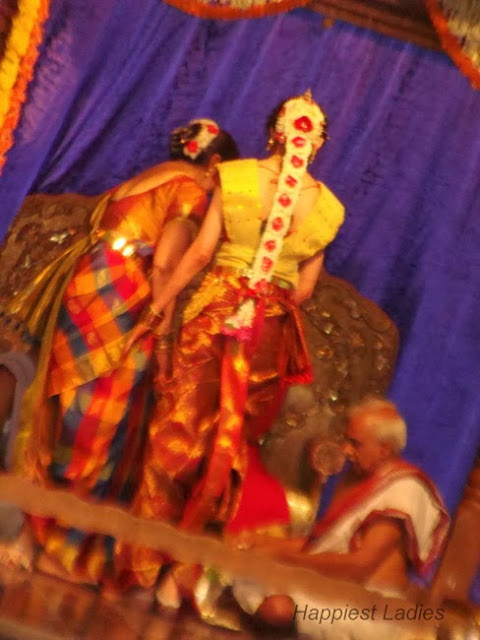

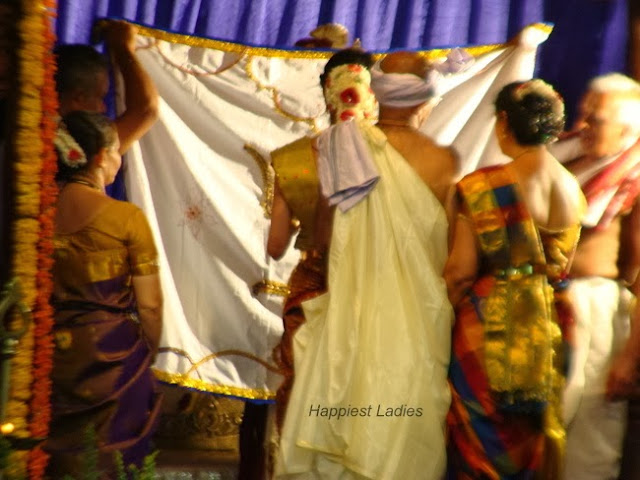




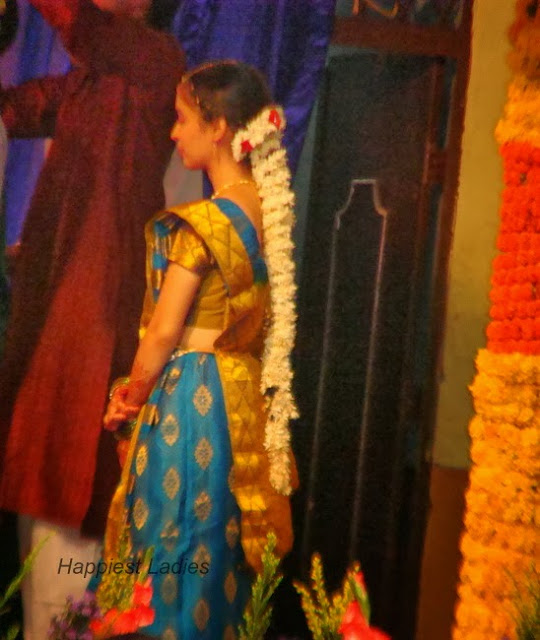



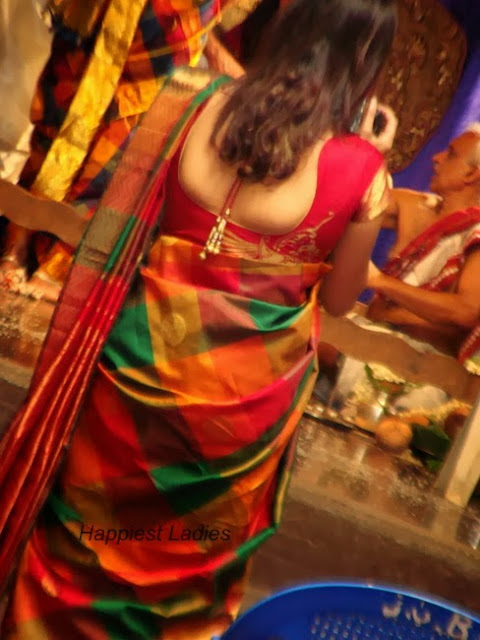
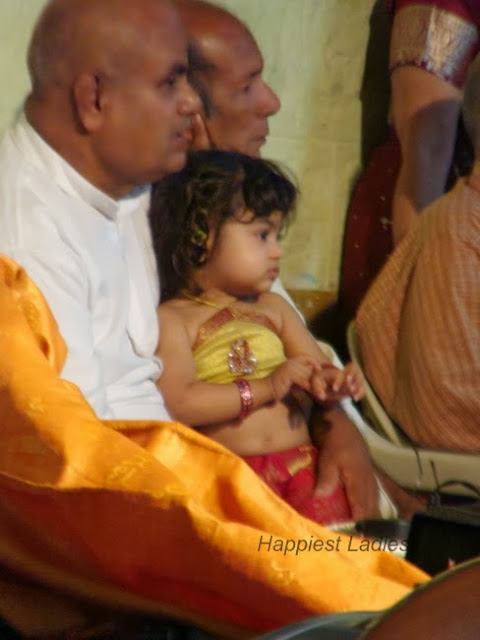
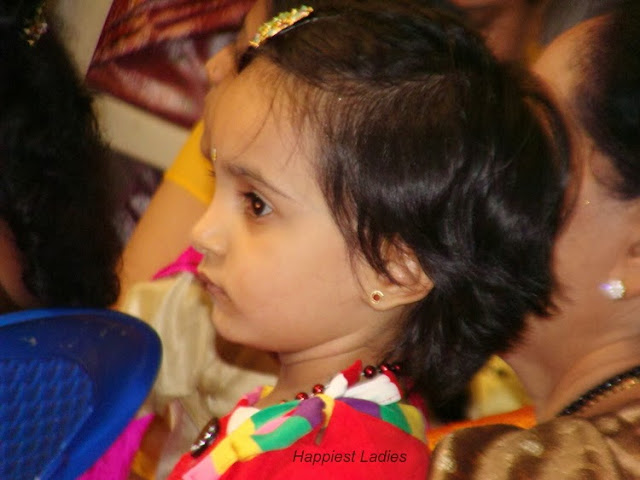










Post a Comment